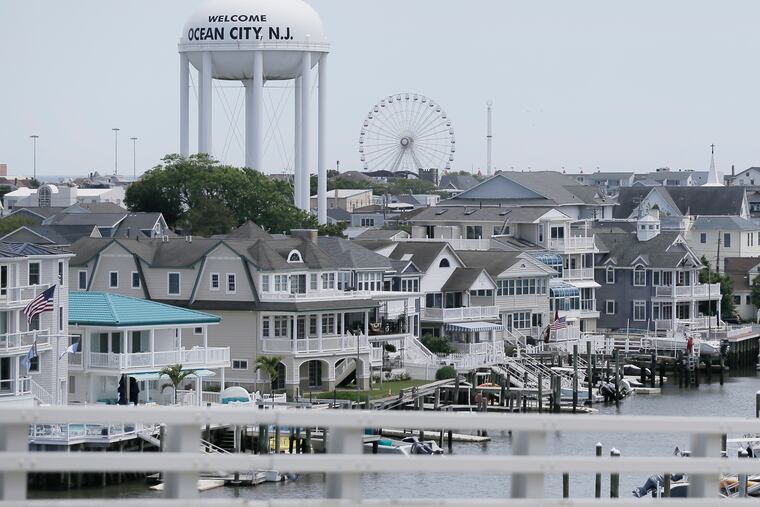At the Jersey Shore, Airbnb tax has some rental owners chafing
The answer depends on whom you ask, and where they stand on the state's new tax on short-term rentals.

This is the third summer that Jeffrey Hayman has rented out his Ocean City condo — but it’s the first year he’s had to discount his rates to entice vacationers to book during peak vacation season.
To Hayman, the reason is clear: New Jersey’s short-term rental tax, which adds more than 11% in sales and use-and-occupancy taxes to the rate of a rental, took effect last fall.
“It’s been a significant financial impact and we had to change our game, if you will, in order to almost fill the place up for the peak season,” said Hayman, of Moorestown, noting that he is earning about 20% less on rentals than last year.
The tax, aimed at leveling the playing field between hotels and home-sharing platforms such as Airbnb, is similar to taxes passed in other states, including Pennsylvania. But in New Jersey, Shore homeowners have complained that the tax is hurting their summer rental business because their clients do not want to pay it.
Airbnb, meanwhile, reports that its bookings increased this year, and that it’s the company’s best-ever season at the Jersey Shore. The company supported the short-term rental tax, even though it means that users pay more.
The company had 143,500 guest arrivals from Memorial Day weekend through Aug. 1, resulting in $31.2 million in rental host income, according to Airbnb spokesperson Liz DeBold Fusco. For the same period in 2018, it had 104,200 guest arrivals, and owners made $22.4 million in rental income through Airbnb.
“It’s a good summer at the Jersey Shore for Airbnb,” DeBold Fusco said. “For us, business is booming.”
So what is happening at the Shore this summer? The answer depends on whom you ask, and where they stand on the new tax.
Not all Jersey Shore vacationers are paying the tax, because rentals facilitated through licensed real estate brokers are exempt — a carve-out that Hayman and other homeowners find unfair. (Homeowners who use real estate brokers do pay a fee that is usually about equivalent to the short-term rental tax.)
A tweak to the tax may be on the way, offering relief to some homeowners. The state Assembly and Senate both unanimously passed a bill this year that would exempt rentals from the tax if arranged directly through the owner rather than onwebsites such as Airbnb or Vrbo.
But Gov. Phil Murphy has not signed the bill, which would take effect immediately with his signature.
Asked about the bill last month during his Ask Governor Murphy monthly radio call-in show on WNYC, WBGO, and WHYY, Murphy said he is studying all of the bills sent to him by the Legislature, and cast doubt on homeowners’ concern about the new tax.
“I know there’s been some anecdotal concern about the Shore tax and I don’t make light of that,” Murphy said. “But there’s also overwhelming evidence that this might be the best summer in the history of the Shore, that places up and down the Shore are well-rented and well-sold out.”
In response to Murphy’s comments, the New Jersey Shore Rentals Coalition, which has been lobbying for a change to the tax, released some data from websites where rentals are advertised. The Shore Summer Rentals website, for example, had 32% vacancy between June 22 and July 20.
A spokesperson said the governor’s office does not comment on pending legislation.
Duane Watlington, a founding member of the Shore Rentals Coalition and a Long Beach Island homeowner, said he uses Vacation Rentals LBI to advertise his home. Data pulled in July from that website showed a 200% increase in vacancies for bookings made for check-in July 20 through Aug. 10 compared with last year.
“I’ve lost three weeks in June that I’ll never get back,” Watlington said last week. “Memorial Day week I had to discount last minute to get somebody in there, and I still currently have weeks in September open.”
Watlington said the bill on the governor’s desk would exempt his renters from the tax, because the website is simply an advertising platform and payment is not processed through it.
Hayman, meanwhile, called the pending legislation “a Band-Aid on a gunshot wound.” He said he does list his home with real estate brokers, but only for the convenience of repeat renters who book through those services. He said he has found better luck filling his summer rental weeks through Vrbo.
If Murphy signs the bill, Hayman said, he thinks it would be unfair to Vrbo to use the site simply to advertise and then attempt to take transactions offline to avoid the tax. But he said he is worried he will have to lower his rates for next season. Some potential renters this year expressed concern about the tax, he said, and didn’t end up booking his unit.
“They were like, ‘Jeez, this is really expensive with all these taxes and fees,’ ” he said. “So we started having to offer them discounts to get them to book. So it’s coming straight out of our pocket.”